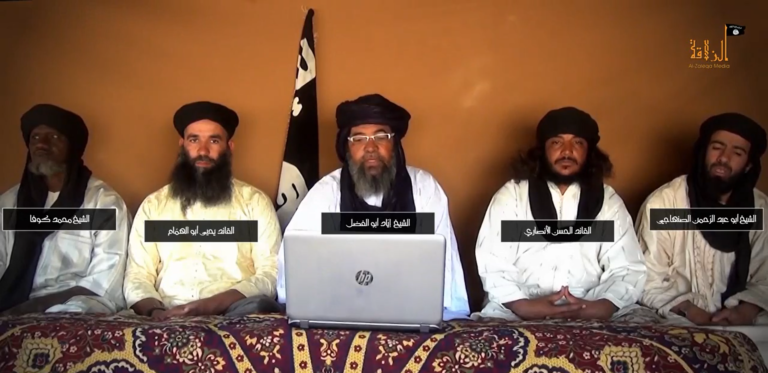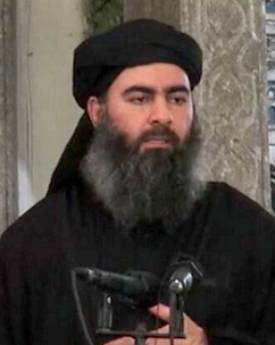 BEIRUT -- A rejuvenated al-Qaeda force asserted control over the western Iraqi town of Fallujah on Friday, raising its flag over government buildings and declaring an Islamic state in one of the most crucial areas that U.S. troops fought to pacify before withdrawing from Iraq two years ago. BEIRUT -- A rejuvenated al-Qaeda force asserted control over the western Iraqi town of Fallujah on Friday, raising its flag over government buildings and declaring an Islamic state in one of the most crucial areas that U.S. troops fought to pacify before withdrawing from Iraq two years ago.
The capture of Fallujah came amid an explosion of violence across the western desert province of Anbar in which local tribes, the Iraqi security forces and al-Qaeda militants have been fighting one another for days in a confusingly chaotic three- way war.
Elsewhere in the province, local tribal militias claimed they were gaining ground against the al-Qaeda militants who surged into urban areas from their desert strongholds earlier this week after clashes erupted between local residents and the Iraqi security forces.
But in Fallujah, where Marines fought the bloodiest battle of the Iraq war in 2004, the militants appeared to have the upper hand, underscoring the extent to which the Iraqi security forces have struggled to sustain the gains made by U.S. troops before they withdrew in December 2011.
The upheaval also affirmed the soaring capabilities of the Islamic State of Iraq and Syria (ISIS), the rebranded version of the al-Qaeda in Iraq organization that formed a decade ago to confront U.S. troops and expanded into Syria last year while also escalating its activities in Iraq.
"At the moment, there is no presence of the Iraqi state in Fallujah," said a local journalist who asked not to be named because he fears for his safety. "The police and the army have abandoned the city, al-Qaeda has taken down all the Iraqi flags and burned them, and it has raised its own flag on all the buildings."
At Friday prayers, held outdoors and attended by thousands of people, a masked ISIS fighter took the podium and addressed the crowd, declaring the establishment of an "Islamic emirate" in Fallujah and promising to help residents fight the government of Prime Minister Nouri al-Maliki and his Iranian allies.
"We don't want to hurt you. We don't want to take any of your possessions," the masked man told the crowd, according to the journalist, who attended the prayers. "We want you to reopen the schools and institutions and return to your normal lives."
| "You just have to do as we say and do everything the way we tell you do it, or we'll kill you. But otherwise return to your normal lives." |
The extent of the militants' control over the town was unclear, however. Some local tribes were challenging their presence, and there were scattered firefights in several parts of the town, according to another Fallujah resident who also did not want to be named because he is afraid. The Iraqi army fired shells into Fallujah from bases outside the town, killing at least 17 people, and most residents spent the day hiding indoors, he said.
In the provincial capital Ramadi, tribal fighters have succeeded in ejecting al-Qaeda loyalists, according to Ahmed Abu Risha, a tribal leader who fought alongside U.S. troops against al-Qaeda following the "surge" of U.S. troops in 2007.
The tribesmen are fighting alongside Iraqi police, Abu Risha said, and among those killed in the fighting was Abu Abdul Rahman al-Baghdadi, the emir, or leader, of ISIS in Ramadi.
"All the tribes of Anbar are fighting against al-Qaeda," he said. "We are happy this fight is taking place. We will confront them face to face, and we will win this battle."
But it was unclear whether all of the tribal fighters battling the al-Qaeda militants were doing so in alliance with the Iraqi government. The current violence evolved from a year-long, largely peaceful Sunni revolt against Maliki's Shiite-dominated government. The revolt was inspired by the Arab Spring demonstrations elsewhere in the region but rooted in the sectarian disputes left unresolved when U.S. troops withdrew.
When Maliki dispatched the Iraqi army to quell one of the protests in Ramadi earlier this week, the local tribes fought back. Maliki ordered the troops to withdraw, creating an opportunity for al-Qaeda fighters to surge into the towns from their desert strongholds and triggering battles across the province.
Though some tribes have now turned against al-Qaeda, others have not, said Kirk Sowell, a political risk analyst based in the Jordanian capital, Amman, who edits the newsletter Inside Iraqi Politics.
"Basically no one is in control," he said. "The situation was really horrible anyway, and the operation against Ramadi made it worse." |
 ...Formerly second in command of al-Qaeda, now the head cheese, occasionally described as
...Formerly second in command of al-Qaeda, now the head cheese, occasionally described as 
 [LongWarJournal] In its official claim of responsibility for Friday’s terrorist attacks in Ouagadougou, Burkina Faso, al Qaeda’s Group for Support of Islam and Muslims (
[LongWarJournal] In its official claim of responsibility for Friday’s terrorist attacks in Ouagadougou, Burkina Faso, al Qaeda’s Group for Support of Islam and Muslims (
 ...the head of ISIS, or what remains of it, and a veteran of the Abu Graib jailhouse. Looks like a new messiah to bajillions of Moslems, like just another dead-eyed mass murder to the rest of us. So far he has been killed at least four times, though not yet by a stake through the heart...
...the head of ISIS, or what remains of it, and a veteran of the Abu Graib jailhouse. Looks like a new messiah to bajillions of Moslems, like just another dead-eyed mass murder to the rest of us. So far he has been killed at least four times, though not yet by a stake through the heart... [EN.ZAMANALWSL.NET] Two
[EN.ZAMANALWSL.NET] Two  A Kiwi jihadist who claimed to be fighting in Syria with the IS has been mistakenly broadcasting his exact location after forgetting to turn off the tracking function on his phone.
A Kiwi jihadist who claimed to be fighting in Syria with the IS has been mistakenly broadcasting his exact location after forgetting to turn off the tracking function on his phone. [Ynet] Documents extracted from home of IS military leader in Iraq show organization leader al-Baghdadi has two deputies to help run Iraq and Syria territories respectively, as well as a 7-man cabinet and governors running the different regions.
[Ynet] Documents extracted from home of IS military leader in Iraq show organization leader al-Baghdadi has two deputies to help run Iraq and Syria territories respectively, as well as a 7-man cabinet and governors running the different regions. [VOA News] The Islamic State group has
[VOA News] The Islamic State group has  BEIRUT -- A rejuvenated al-Qaeda force asserted control over the western Iraqi town of Fallujah on Friday, raising its flag over government buildings and declaring an Islamic state in one of the most crucial areas that U.S. troops fought to pacify before withdrawing from Iraq two years ago.
BEIRUT -- A rejuvenated al-Qaeda force asserted control over the western Iraqi town of Fallujah on Friday, raising its flag over government buildings and declaring an Islamic state in one of the most crucial areas that U.S. troops fought to pacify before withdrawing from Iraq two years ago. A young Saudi, who was brainwashed to fight in Iraq where he narrowly escaped death and suffered scarring to his face and hands in a failed suicide attack, recently called on young Saudis not to follow in his footsteps and be wary of militant groups in Iraq.
A young Saudi, who was brainwashed to fight in Iraq where he narrowly escaped death and suffered scarring to his face and hands in a failed suicide attack, recently called on young Saudis not to follow in his footsteps and be wary of militant groups in Iraq.